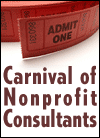 Hello and welcome to my first time as a host for the Carnival of Nonprofit Consultants! This week was an open call, with a personal preference for social change and social marketing type posts.
Hello and welcome to my first time as a host for the Carnival of Nonprofit Consultants! This week was an open call, with a personal preference for social change and social marketing type posts.
The posts listed below largely discuss and point to current nonprofit marketing trends and potentially future marketing trends. Though this might not reflect social marketing per say, it is a reflection of social change….how trends surface, alter, flourish, downsize and in essence, change. So enjoy this week’s carnival!
- Jordan Viator at Connection Cafe’s post Glimpses of the Past, Present and Future Online Communication Practices for Nonprofits provides an audio file from a panel discussion with nonprofit guru Vinay Bhagat. In the discussion and as Mr. Viator reflects, marketing techniques have largely changed from 2003 to 2008…greatly thanks to new media, pointing out the next big trend of constituent empowerment.
- ***Inserting my special ‘bonus host post’ here, as it follows up well with Mr. Viator’s idea. In my post Consumerism. What’s Your First Reaction?, I too coin my own term ‘optimistic consumerism,’ explaining that with changing media and times, the consumer is becoming more empowered than ever by having a choice. In particular, not only do we have a choice of what products or services we consume, but we also have a choice in the place we consume our information. *Props to choosing the Carnival, 😉
- Rebecca Leaman at Wild Apricot continues the discussion of change in her post titled 5 Keys to Effective Knowledge Transfer for Nonprofits, where she outlines how effective communication can transfer through each phase of a message. No matter how the times and technology change, Ms. Leaman’s insights and download-able resource is priceless.
- Bryan Miller at Giving in a Digital World maps out the technology hype cycle in his post titled Online Fundraising and the Hype Cycle. Mr. Miller points out how web 2.0 is making the way for community fundraising 2.0 and that knowing where your nonprofit’s fundraising efforts are will put you and your organization ahead of the curve.
- Jason Dick at A Small Change-Fundraising blog outlines three core values of traditional nonprofit fundraising in his post: Cultivation, Solicitation and Stewardship. However, Mr. Dick points out that while the traditional model is good, the big umbrella term that deserves attention is relationship. According to Mr. Dick, a good relationship means good fundraising and “all bets are off” on the traditional process.
- J. Karlin at Marketing and Fundraising Ideas sets the stage on how to implement change in the post Powerful yet Reasonable Goals. Karlin says that before change can even be accomplished as was in the case study given of Tufts University, one should dream big, and not overlook setting reasonable, attainable goals.
- Last but not least, Jeff Brooks at Donor Power Blog offers up that any amount of change, is good change, in his post Tiny Gifts: Good or Bad?.
Thanks for tuning in to this week’s carnival. Thank you for all of the submission’s this week, as I’ve found new blogs and bloggers to follow, along with some great ideas about cha-cha-chaaaange!
Keep track of the Carnival of Nonprofit Consultants, no matter which blog is hosting, by subscribing to the Carnival feed.



